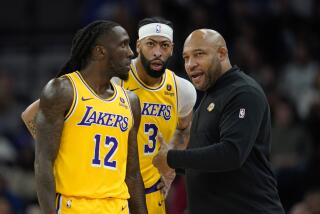Legendary Coach Iba Dies at 88
- Share via
Hank Iba, who coached the U.S. Olympic basketball team to two gold medals and guided Oklahoma State to two national championships, died Friday of heart failure in Stillwater, Okla. He was 88.
“There’s no question that the game lost one of its teaching giants,” USC Coach George Raveling said. “Many of the defensive concepts you see utilized today by high school, junior college and college coaches originated in his head.”
John Wooden, who coached UCLA to 10 NCAA titles, agreed.
“He’ll be remembered as one of the great coaches because he didn’t complicate the game,” Wooden said. “Today, more than ever, coaches are taking a relatively simple game and complicating it, and he didn’t do that. I think of him as a fundamentalist.
*
“I always equated Iba along with Mr. Rupp (Adolph Rupp the late Kentucky coach),” Wooden said. “They were from that same era in the late 1950s and early 60s. Iba was a ball control coach who stressed defense, where Rupp stressed the fast break and defense.”
He was the second-winningest coach in college basketball history, with 767 victories in 41 years, using a disciplined, ball-control style.
“Of all the shadows that cast over the game of basketball, his was the biggest,” Indiana Coach Bob Knight said in a statement.
Knight, who coached the U.S. Olympic basketball team to a gold medal in 1984, made Iba a consultant to the team, asking him to attend practices and address the team before games.
Although Iba coached the U.S. team to its Olympic victories in 1964 and ‘68, he also coached the first U.S. team that failed to win an Olympic basketball gold medal. That was the 1972 team, which lost to the Soviet Union in one of the most controversial finishes in Olympic history. The United States apparently won the game in regulation, but the clock was reset twice, giving the Soviet team three chances to score the game-winning basket. Iba, whose wallet was stolen in the confusion after the game, and his players never accepted their silver medals.
“We won the game, no question about it,” Iba said in an interview with the Associated Press in February 1990. “That thing was over.”
Ed Ratleff, a former Cal State Long Beach player who was on that Olympic team, said: “I think we won. I don’t care what people say. But I think if we had a different team we would have won with a bigger margin. What I mean is that we had all these racehorses who wanted to run and he had a slowdown offense.
“He was a taskmaster, but if you were a coach and did some of the things he did, I’m sure you would have been successful, because he was very good at it.
“I don’t think his style would work nowadays, but it would help if you used the discipline he taught. Even with all the fast-break style of today, you still have to take care of the ball.”
Although Iba retired in 1970, his influence is still felt.
Former Oregon State coach Ralph Miller, who played and coached against Iba, said he probably produced more coaches than any other coach.
“If you go back to the late 1950s and ‘60s, anyone that was looking for a new coach always called up Mr. Iba, and he always had someone to recommend,” Miller said. “And the whole Iba family almost ended up being coaches.
“He was a great man--no ifs, ands or buts about it. The coaches of the 1930s are the people who put modern basketball together. There haven’t been any real changes since 1940. The jump shot was the last real innovation. But the principles of defense and the concepts of offense were developed by the people, and one of those was Henry Iba.”
Iba’s son, Moe, coaches at Texas Christian, and his nephew, Gene, coached at Baylor. Oklahoma State Coach Eddie Sutton also played for Hank Iba, and Texas El Paso Coach Don Haskins was an Iba disciple.
“He began his career with coaches like Phog Allen and Adolph Rupp and finished with Dean Smith and Bobby Knight, and all the people recognized what he had given to the game,” Sutton told the Associated Press. “They all admired the class that he brought to the game.”
Born Aug. 6, 1904, in Easton, Mo., he attended Oklahoma State, then called Oklahoma A&M;, and began his coaching career in 1927 at Classen High in Oklahoma City. He moved to Marysville (Mo.) Teachers College two years later.
Iba’s brother, Clarence, who played for him at Marysville, went on to coach at Tulsa in the 1950s. Iba’s brothers, Earl and Howard, who also played for him at Marysville, became high school coaches.
After spending four seasons at Marysville, he moved to Colorado for a season before going to Oklahoma State, where he coached 36 years, winning 655 games.
Funeral services will be held Monday afternoon at the Gallagher-Iba Arena at Oklahoma State. Oklahoma Gov. David Walters ordered that state flags be flown at half-staff until after 5 p.m. Monday in memory of Iba.
Hank Iba
A look at the coaching record of Hank Iba, who died Friday:
YEAR SCHOOL W L 1930 NW Missouri State 31 0 1931 NW Missouri State 32 6 1932 NW Missouri State 26 2 1933 NW Missouri State 12 6 1934 Colorado 11 8 1935 Oklahoma A&M; 9 9 1936 Oklahoma A&M; 16 8 1937 Oklahoma A&M; 20 3 1938 Oklahoma A&M; 25 3 1939 Oklahoma A&M; 19 8 1940 Oklahoma A&M; 26 3 1941 Oklahoma A&M; 18 7 1942 Oklahoma A&M; 20 6 1943 Oklahoma A&M; 14 10 1944 Oklahoma A&M; 27 6 1945 Oklahoma A&M-x; 27 4 1946 Oklahoma A&M-x; 31 2 1947 Oklahoma A&M; 24 8 1948 Oklahoma A&M; 27 4 1949 Oklahoma A&M-y; 23 5 1950 Oklahoma A&M; 18 9 1951 Oklahoma A&M; 29 6 1952 Oklahoma A&M; 19 8 1953 Oklahoma A&M; 23 7 1954 Oklahoma A&M; 24 5 1955 Oklahoma A&M; 12 13 1956 Oklahoma A&M; 18 9 1957 Oklahoma A&M; 17 9 1958 Oklahoma State 21 8 1959 Oklahoma State 11 14 1960 Oklahoma State 10 15 1961 Oklahoma State 15 10 1962 Oklahoma State 14 11 1963 Oklahoma State 16 9 1964 Oklahoma State 15 10 1965 Oklahoma State 20 7 1966 Oklahoma State 4 21 1967 Oklahoma State 7 18 1968 Oklahoma State 10 16 1969 Oklahoma State 12 13 1970 Oklahoma State 14 12 Totals 767 338
x-NCAA champion
y-NCAA runner-up
CAREER HIGHLIGHTS
* Ranks first in games with 1,105.
* Ranks second in victories with 767.
* Tied for fourth in seasons with 41.
* Tied for fourth in 20-victory seasons with 18.
* Tied for seventh in seasons at one school with 36 at Oklahoma State.
* Coached the U.S. men’s Olympic basketball team to gold medals in 1964 and 1968 and a silver medal in 1972. Also served as honorary coach of the gold medal-winning Olympic basketball team under Bobby Knight in 1984.
* Coached the Oklahoma State baseball team to a 79-37 record from 1935-41.
More to Read
Go beyond the scoreboard
Get the latest on L.A.'s teams in the daily Sports Report newsletter.
You may occasionally receive promotional content from the Los Angeles Times.










